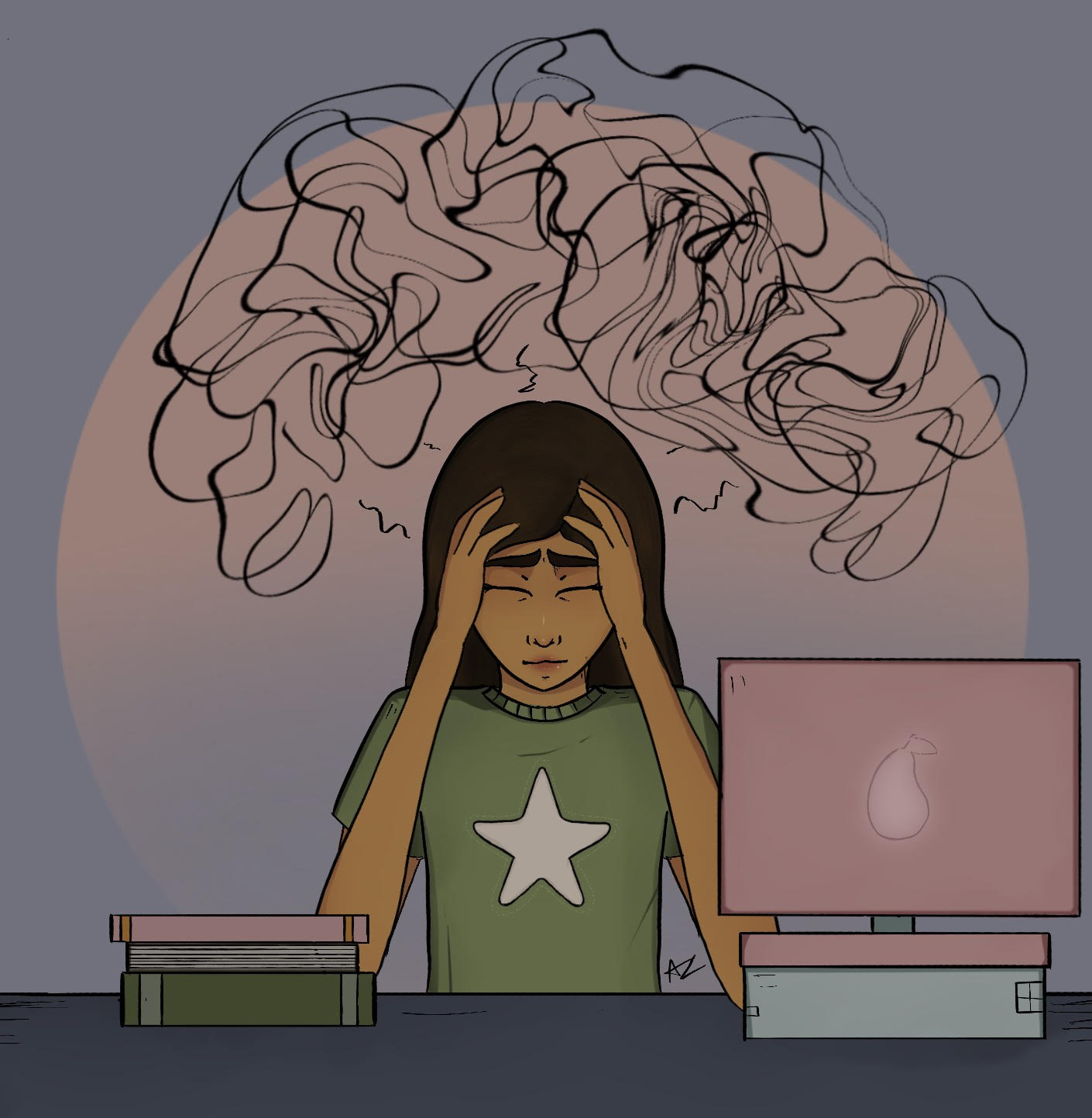
On March 11, 2020, the World Health Organization declared that the coronavirus was officially a pandemic. Fast forward two years later and people around the world still face the dangers of the virus everyday, but now they’re doing that while managing life as well.
High school students, like myself, are adjusting back to in-person learning after a year of online instruction. It was no surprise that students were excited to return, but the shift from online to in-person learning had sparked certain stress that was long forgotten.
Things like excessive schoolwork, demanding jobs, sudden illness, and extracurricular activities are all factors that have contributed to many people’s physical and mental exhaustion. It is important that we learn how to manage the mental stability of our minds, so we aren’t overloaded.
To better understand how stress ties into our mental health, I researched many ways to manage stress and various reasons why taking care of yourself when mentally exhausted is essential.
Writer, activist, and public speaker Sarah Browne said, “Taking care of our mental health aids in our resilience and recovery from anything that happens.”
When your mind is overwhelmed, it tends to take a toll on the rest of your body. The harmful effects of stress and exhaustion can fan out and have a more serious effect on one’s physical and mental health. Our minds are forces that encompass our wellbeing and tell us what to do in everyday life, so when that is affected, so is everything else around us.
Research shows that 43.8 million people experience mental illness, which is 18.5% of our total population. Due to the emotional nature of a global pandemic and other factors, mental stress has played a hand in many different lives. If left untreated, mental stress can create widespread disabilities, stifling an individual’s ability to function properly and slow their pace.
For example, longitudinal studies have shown that sleeplessness, migraines, weight gain, irritation, and lack of concentration are just a few of the potential side effects of long-term stress. It is completely normal to feel the side effects of stress. Usually, when engulfed in things that are too much, a human’s ability to cope, adapt, and solve problems are impacted heavily.
But our stress is not something to be ashamed of. The wiring of our brains is not our fault.
Many people think that being stressed is not a big deal or it is something that will pass over with time, but the truth is, stress has a sneaky way of building up and it can manifest into different things if you let it become a threat to yourself.
Signs of mental exhaustion can creep up on you during periods of extreme tension, especially when it is weighing on you. It may even reach the point where you feel as if you’re in a hole with no way out.
In addition to this, some emotional signs of stress and exhaustion include depression, anxiety, detachment, anger, feeling of dread, hopelessness, and decline of productivity.
Some physical signs include fatigue, loss of appetite or interest, upset stomach, and weight loss.
Poor performance at work or school, social withdrawal, and the inability to keep certain commitments are behavioral signs.
Psychology Today says that stress can lead to changes in many different parts of the body. It can cause a faster heartbeat, muscle tension, and gastrointestinal issues. All of these symptoms are reasons why people should take stress seriously. Do not wait it out because ongoing stress attacks the immune system and makes it more vulnerable. It decreases white blood cell production which contributes to illnesses such as heart disease, cancer, and others.
It is clear that if not treated, stress can literally exhaust the body and affect every part of it leaving individuals almost nonfunctional. To add, Psychology Today also said that “marinating in high levels of stress hormones that are produced naturally every day can prompt the brain to function differently.”
If this doesn’t make you want to participate in more self-care, I don’t know what will.
That said, how do we deal with our stress?
Many people deal with their stress in different ways, but let’s start with a few easy things one can do to cope with mental strain.
Relaxation techniques like deep breathing, meditation, yoga, or massages are great methods. I would also recommend exploring your hobbies like reading a good book, creative writing, or listening to music.
According to a Verywell Mind article by Dr. Elizabeth Scott called “What Coping Strategies Can Help Manage Stress,” using coping techniques does not necessarily change your particular situation, but it does change your perception of it.
Things like journaling down your feelings or practicing loving acts of kindness will increase that positive feeling inside of you, clouding the depressive part planted by stress and exhaustion.
As mentioned, there are many ways to deal with stress. I asked a couple peers and teachers what stressed them out and how they dealt with it.
Destiny Cooks, an Edison High School student involved in extracurricular activities and sports, said school stresses her out.
“I deal with it by going home and watching my favorite shows and movies which stimulates my mind,” Cooks said. “I also take long warm showers and drink my favorite tea, then drift off to sleep.”
Katherine Cozad, photography teacher at Edison High, said deadlines are where most of her stress comes from.
“Deadlines stress me out mostly,” Cozad said. “I’ve had to learn to manage stress many different times in my life. One thing I do is write down the things that are stressing me out and I cross off the things that are out of my control, allowing me to focus on what I actually can do to move out of it.
“I also remind myself that above all, learning from my mistakes is the human experience,” she continued. “I definitely show self-compassion meaning I acknowledge what I did or didn’t do, but I try to look at it as what can I learn from this, and that way, I actually deal with it and move on.”
Cozad further explained, “I used to just beat myself up and almost ignore the thing because I didn’t want to acknowledge it because I felt the need to be perfect in order to be liked. Meditation, music, or jazz helps by reminding me that everything is going to be okay. This is life, and it is what it is, and it’s not supposed to be anything else.”
Managing stress and anxiety is crucial to your wellbeing. If you are ever overwhelmed by the things in everyday life, you should make time for yourself. Practicing self-care can be very stimulating and help you perform better.
Whenever I am emotionally overwhelmed, I like to do things that will distress my mind and body like reading a good book, writing a poem, or talking to a loved one about what I’m going through at the moment.
Mental health is significant, and you should take care of it at all stages of life.


